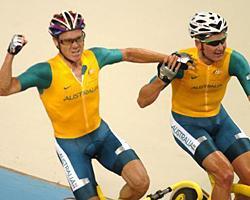
Recently on Cyclingnews.com |
An interview with Stuart O'Grady, October 27, 2004
The Year of Living Dangerously
From being down in the dumps at the height of the Cofidis doping scandal to a personal career-best victory in Athens, Stuart O'Grady has experienced the full range of emotions in what can only be described as a year of living dangerously. Story by Anthony Tan.
"Nothin' feels like coming home at the end of a long season... there's no place like Australia, really," says Stuart O'Grady with a sigh of relief, unable to avoid the cliche that is so often said when returning to one's homeland.
"It's just nice to come back and see the family and catch up with friends, kinda relax a bit, I guess," he says, although his voice's slightly hesitant, as if he's unsure whether he can relax.
"That was really the icing on the cake, right the way through the company"- O'Grady on the significance of his victory on Stage 5 of the Tour de France |
Maybe that's because when we last spoke, O'Grady and his entire Cofidis team were embroiled in a doping controversy that threatened to reach Festina-like proportions, reaching full-throttle when his former team-mate David Millar admitted using EPO to fuel his world time trial championship win in Hamilton last year.
And now, when we speak again, the 'D' word rears its ugly head once more.
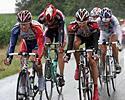
|
Today in Sydney, O'Grady and team-mate Matt White will speak about their season in a public forum, which he claims has been "completely misread" as a discussion on insights into doping and drugs in sport, despite the title: "Cycling - The Truth."
"It's actually got nothing to do with the night," he says defensively. "The occassion is to come to Sydney and look back on 2004 and talk about what has happened; it's more of an insight into the year I've had, and Matt's been there with me and has been a very important factor."
When I mention that through no fault of his own, but simply by circumstance, it's inevitable the subject will come up, O'Grady begins to loosen a little.
"I've got no problem in talking from my own personal point of view - the devastation of being suspended and sitting at home and having no control of the situation - that angle I'm quite happy to talk about, because it was a big part of the season and it did change everything and it did happen, I'm not afraid to talk about it. But I think it has been blown a bit out of proportion in the media recently."
After the trials and tribulations the entire Australian track cycling team encountered, hounded by the press and defending allegation after allegation in the lead-up to Athens, it's little surprise his feelings for the media are still raw. The Aussies responded in the best way possible, bringing home a record haul of gold medals and becoming the most successful Olympic cycling team in history - with O'Grady a large part of it.
Yet ever since he returned home a little over a week ago, he's still been asked questions about what happened - even though at the time, he was 17,000 kilometres away in Toulouse, preparing for his seventh Tour de France.
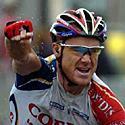
|
On July 8, when O'Grady escaped with four others on a 200 kilometre, windswept and rainy stage to Chartres, the weight of expectation was immense. A win would give the team - and company - a chance to redeem themselves after almost two months on the sidelines, and even though there was over 180 kilometres left to race when the break went, you just knew the guy who once described himself as a "freckly red-headed bastard from Adelaide" after taking his first maillot jaune in 1998 wasn't going to lose.
"Yeah, there was a lot of relief; I think that win was really for the team - and I think that was an important stepping stone for Cofidis... that was really the icing on the cake, right the way through the company," says O'Grady. "It was a very, very big moment for the whole team. It kept the whole spirit alive and showed a big thank you to François Migraine and the people responsible for letting the team continue."
It certainly was a big moment. And in many ways, it spelled the beginning of O'Grady's reversal of fortune, who became one the favourites to succeed Jan Ullrich as the next Olympic road race champion after a remarkable World Cup victory at the HEW Cyclassics, the first by an Australian since Phil Anderson won Amstel Gold 21 years prior.
"I wouldn't have felt I'd completed my career if I didn't have an Olympic gold medal... it's been a burning desire of mine since 1992" |
The question was whether he could hold his form for another fortnight. "I think it's a pretty fine line between holding form and basically blowing up," admits O'Grady.
"I know from this year it's a complete mind game and I was able to keep focused through different training methods through my coach. We used a lot of different training techniques where I trained hard and fast, but not long and draining."
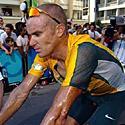
|
Other stuff
|
However, few expected how long and draining the road race would be, and what he now believes to be an error of judgement, the searing, furnace-like temperatures coupled with the Aussies' overly-aggressive race strategy cost them any chance of a medal.
"I rode a very different race to what I would usually do in Athens, and looking back, I think it was a mistake," he says.
Explains O'Grady, "My forte is conserving energy as much as possible in the first 200 kilometres and racing the last however far it is, whether it be 30 or 60 k, like a Classic. That's my style - Milan-San Remo, Hamburg or Paris-Tours, they're all similar type of events - you've got to have as much petrol in the tank as you can manage for the last 50, 60 kilometres of the race. I think in Athens, I probably burned up a bit too much energy staying near the front at the start of the race and obviously paid for it at the end."
However, O'Grady's biggest challenge was to come 11 days later, where he was to team up with Graeme Brown in the Madison, Australia being the defending champion in its inaugural run at Sydney 2000.
Not just because an Olympic gold medal was a dream he's been chasing for the last 12 years, but the added pressure due to his slightly controversial selection, which saw him take the spot of a much younger and arguably equally talented, but far less experienced Mark Renshaw. The fact that O'Grady advised Cycling Australia of his interest while out training one day for the Tour de France - just six weeks before the Games - only complicated matters further and created speculation on whether he was indeed the right choice.
Asked whether it bothered him, O'Grady dismisses those who thought less of his talent.
"I think the only people we worried about it was the people that didn't think I could do it... it's not as if I've never ridden the track before," he says.
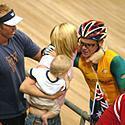
|
"I didn't have to sell myself to the selectors - I think they knew my capabilities, even though I hadn't been in a six-day or something for a couple of years - and it's not an event you forget how to do. My skills hadn't gone anywhere, and you just don't forget how to do that stuff... yeah, I felt for Mark, but at the end of the day, they decided to put the team that would win the gold medal."
Which is exactly what he and "Brownie" did in a virtually flawless display of riding, where this time, being the early aggressor and maintaining that aggression paid dividends in gold.
"For me personally, that's the best result of my career," he says, taking me a little by surprise by the speed and strength of his conviction. "Y'know, to come so close so many times, I wouldn't have felt I'd completed my career if I didn't have an Olympic gold medal... it's been a burning desire of mine since 1992."
Most expected he would return home soon afterwards, having achieved everything and more than he expected, but Stuey wasn't done - there was a rainbow jersey up for grabs. Besides, his intention was to come back to Australia and do bugger all for four weeks before resuming training, and the earlier start to his training schedule would have undoubtedly impacted on his 2005 campaign.
Describing himself as a "natural competitor" ("I actually prefer to be racing and to be out there, slogging into a headwind for five hours," he half-jokes), O'Grady prepared himself for a crack at the world title by riding the Vuelta a España - and did surprisingly well.
"If you're going to come out and win Paris-Roubaix, you're not going to give a shit if it's called the World Cup or not"- Asked whether he'll miss the World Cup with the advent of the Pro Tour in 2005 |
At the time of his departure two weeks into the race, O'Grady was second in the points competition behind eventual winner Erik Zabel after a pair of second and thirds and four fourth places, but thought it wise to leave early so as to not toast himself before Verona.
"The last week was just going to be mountains and... murder, " he chuckles, "so I thought it's probably better that my body does shut down, because then they'll be no coming back. But it was a very bizarre situation and it was something I've never done before."
Henk's still my mateIt's no secret O'Grady and Henk Vogels used to be the best of friends during their time at GAN and Credit Agricole in the late '90s, but when Vogels was asked to ride at the service of his freckly-faced pal in 1999 after returning from injury, the dynamic between them began to change. Although on a far less dramatic scale, it was reminiscent of the rift between Paolo Bettini and Michele Bartoli at Mapei after "Il Grillo" won his first Liege-Bastogne-Liege in 2000, which saw Bartoli leave for Fassa Bortolo the following year when asked to ride at the service of his former domestique. Vogels did likewise, leaving Europe to ride for Mercury in 2000 and going on to forge a successful career in the United States. O'Grady, however, remained at Credit Agricole for another four years, blossoming into one of the world's best one-day riders, earning a second spell in the maillot jaune at the 2001 Tour, winning the Australian Road Championships in 2003, and finishing on the podium at Paris-Tours and the Tour of Flanders the same year. I asked O'Grady whether placing your career before friendship is simply part of the job. "Aww, Henk's still one of my friends," he says bashfully. "For sure, we haven't been in much communication - but there's definitely not a word of anger between us. "As far as I'm concerned, we're still friends - we've never been anything but that. Yeah, it's just been a case of living in different timezones and never seeing each other. But after a few beers, Henk and I are hugging and carryin' on like nothing's changed; I think the Australian attitude is what makes [our friendship] so special." Good to hear they're still mates - with Vogels returning to Europe with Davitamon-Lotto in 2005, there's sure to be plenty of "hugging and carryin' on" whenever these two are seen knocking back a few quiet ales. |
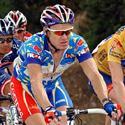
|
In retrospect, his decision was a wise one, and had the winning move come from the initial group of six that formed on the final acension up the Torricelle that O'Grady was a part of, he may well have brought home a rainbow jersey. Despite a group of 10 or so riders rejoining on the descent, he still managed to place fourth behind Spain's now three-time winner Oscar Freire, who was simply untouchable on the day.
Unfortunately for the Aussies, never did the team expect to have two riders going for the win in O'Grady and Allan Davis, who was one of the 10 to tag back on the descent and finished one place behind in fifth spot. However, after the two swapped places at the following weekend's Paris-Tours World Cup, there's no doubt they'll be talking a lot more in world championships to come.
Says O'Grady with admiration, "I think Alby's [Davis] got a massive future. He's an extremely talented bike rider and has been looked after very well in Liberty; Manolo [Saiz] is a very smart man and he's not going to make a mistake with such a gifted rider. I think Alby's got the world at his feet; he's going to become one of the best one-day Classic riders around."
Speaking of the Classics, O'Grady was lying fifth overall in the World Cup after Paris-Tours, having ridden just four out of the nine races at that point. Had he ridden at least six of the ten events - something he would have done had his team not been suspended on the eve of Paris-Roubaix - he would have at been a contender for the podium at the very least.
But with the introduction of the Pro Tour and the simultaneous termination of the World Cup, it's a little disappointing we won't ever know whether we may have seen Australia's first World Cup champion in 2005.
"The World Cup jersey was something special, I think, because there's obviously only one other noticeable jersey, and that's [that of] world champion," O'Grady says upon reflection. "I think the World Cup and the World Cup races had a special place in cycling - they are the 10 toughest events on the calendar - and it's nice to have a competition within the competitions.
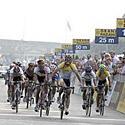
|
"But" - his voice begins to pick up - "even though it's not going to continue as such, if you're going to come out and win Paris-Roubaix, you're not going to give a shit if it's called the World Cup or not," he laughs. "You'd be pretty happy, no matter what!"
"They may not be called the World Cups, but that will be my major objective for next year. Obviously, trying to win a stage in the Tour, too; I'll probably let the green jersey slide and focus on winning stages," he says.
All in all, not a bad year for a freckly, red-headed bastard from Adelaide.

